This is how I remember it: One night at dinner when I was six, Dad announced that we were going to Spain for a year. He was a professor who for years had been dreaming of starting a studies abroad program in the Basque town of Oñati, and it was finally going to happen. He was taking about 80 students over. Mom and all five of us kids would be going too.
Different reactions around the table, not all of them happy. A year is a very long time when you’re six, beyond comprehension. And Spain was Mars. Did they have cartoons there? Peanut butter?
This was in 1974, and parts of Spain were still barely developed. By then in its fourth decade, the suffocating dictatorship of Generalisimo Francisco Franco was alive and well. So was ETA. In fact, just a few months earlier ETA had completed its biggest operation, the assassination of Franco’s heir apparent, Prime Minister Luis Carrero Blanco. They blew his car up with 200 pounds of explosives planted in a tunnel they’d dug under a Madrid street. The car flew over the roof of a monastery and landed atop a balcony on the other side.
Then, just days before we arrived, a bomb exploded near the building where the students’ dorms and classrooms would be. Nobody was hurt, but the message was clear: We wouldn’t be in Idaho anymore.
Today, if a professor proposed a studies abroad program under those circumstances, the lawyers would laugh her out of the room. Of course, who knows if Dad even consulted with the university’s lawyers? If he did, apparently the lawyers said: No problem. Those were the times.
We left around Labor Day. Many tears in the airport. Going to Spain then was different from going to Spain now. No Internet. No e-mail. No English newspapers or TV channels. Letters could take two weeks. Calling was ghastly expensive and barely audible. We were going to the desert for 40 years.
Flying away from New York, a terrifying place, I watched the United States disappear behind me out the window.
We landed in Madrid. There were big guys wearing green uniforms and shiny black tri-corner hats, like those worn in the U.S. Revolutionary War but scarier. They held machine guns. It was my introduction to the Guardia Civil, Franco’s national police force.
Everybody – and I mean everybody – smoked, and everybody smoked everywhere. There was a sheen of smoke in the airport, outside the bus, in the elevators, in the movie theaters. The smell crawled into the folds of our clothes and it’s still there today.
After about 30 hours of traveling, we arrived in Oñati at night. It was a town of 10,000 in a beautiful valley where everyone knew everyone. The streets were so narrow I could have reached out the bus window and touched the buildings. The signs were incomprehensible. I had just learned to read and suddenly I could no longer read.
I was seven by then, but a year was still a long time and it seems even longer the night you land in a place where they don’t speak English and sometimes they don’t have normal toilets, just little holes in the ground with porcelain grips where you stood.
We moved into a place called Villa San Jose, a house on the edge of town that had seen its best days around World War I. It was freezing and wet no matter the weather, the water ran cold much of the time, and the lights didn’t make a dent in the vast darkness of the rooms. And yet that spooky house was a paradise for me. Snails crawled on the mossy stone walls out back, and I organized very slow races. There was a Saint Joseph statue at the top of the roof that lit up at night. There were a million places to hide.
Before long, it was the first day of school. Under Franco, instruction in the Basque language was illegal, but they had started a Basque school in Oñati anyway, run on a slim budget by Augustinian priests. Spanish, Basque – it didn’t matter to me. I didn’t know either.
If you don’t cry, Mom said, I’ll buy you a treat at the end of the day. Okay. She dropped me off, and I saw all those kids staring at me, and the teacher smoking at the desk, and I burst into tears. The teacher walked me to my desk and tried to help me with the few words of English she knew, but I sat with my hands over my eyes much of the morning pretending to be anywhere else. After a while, I started to draw some pictures on the paper, which itself was all wrong because its lines went both directions, not just horizontally like normal paper did.
Somehow I made it through the morning, and Mom was outside to pick me up for lunch. How did it go? Did you cry? I looked down. Nope. Didn’t I deserve to lie after all my suffering?
When she took me back for the afternoon session, she had to pry me off of her. It’ll get better, she said. You’ll make friends. How? It was a good question, but somehow she was right because I walked home that day with a couple of new buddies. Kids are great because they don’t have to talk all the time.
After a few weeks, I started walking to school by myself. I had to pass a civil guard station, and one of them was always posted out front on the narrow sidewalk. I’d walk on the other side of the street, sneak a peek at their uniforms and moustaches and machine guns. And those hats. I passed by them four times a day, and it was scary four times a day.
When you walked by a butcher shop, you could see big beef tongues sticking out at you from trays. Plucked chickens with their heads still on, lounging around in stacks and staring at the customers.
I was always picked last for soccer games, but how could I blame them?
Those first few weeks it rained every day. The river by the school swelled and you could see rats scrambling for higher ground under the bridge.
Guys peed outside against the walls, in the corner of a handball court, or pretty much anywhere in broad daylight. Teachers did it too. Some mornings during fiestas the air was still heavy with the acrid smell remaining on the walls from the night of big fun.
Bursts of sunflower seed shells on the cobblestones by the benches, and the smashed remains of cigarettes everywhere. Littering was okay. Trash cans were just suggestions. I saw a woman open her kitchen window and toss a bag of garbage to the river below. It splashed, sunk, resurfaced, and drifted to the bank with the rest of the garbage.
Many nights, Dad came home nervous and tired. There were problems at school. A student had run into trouble out late in another town. There was no heat in the dorms. Or a thousand other things. He was in charge of 90-plus lives, knew no Spanish and just enough Basque to bluff through a card game. He seemed to be surviving on charm and Latin he’d learned as an altar boy. But somehow he and others made things work out. I didn’t appreciate then what a miracle that was.
And anyway, I had my own language struggles to deal with. I never really knew what was going on in school that year. Bit by bit, I picked up some Basque, although God alone knows what it sounded like. I was a unicorn: a little American kid speaking Basque, which many Basques couldn’t even speak. Of course, I wasn’t supposed to be speaking it in the first place. We were supposed to be speaking only Spanish at school. We had little fire drills to practice for surprise visits by the local school officials. We scrambled to replace the Basque text books with Spanish versions. We stood up and said, “Buenos Días, Señor Inspector!” It was a risky ploy, since many kids didn’t know any more Spanish than I did.
Franco was everywhere, on stamps, money, television. He was just an old bald man with a thin moustache and a sour puss, but he gave me chills then and he still does today a little bit. My classmates told me about the things he did to Basque prisoners and others: His guards whip them and tinkle on them; they cut off their noses and wieners; they barge into people’s homes in the middle of the night and cart them away, and nobody ever hears from them again.
I bought candy with coins, and there was Franco’s dour mug. When you got change back, no matter what size, there he was again.
I liked to watch the Pink Panther on Saturdays because there was no dialogue, and I understood what was going on.
After freezing for months, we gave up on Villa San Jose and the mysteries of its dark corners and moved to an apartment closer to the students’ campus, which for me meant four bus rides every day. But I was glad not to have to pass by those guards anymore.
I made my first communion, which in Oñati was really more like a coronation. I was showered with gifts, including a watch that all the kids on the program pitched in to get me. It was presented by one of the guys, Billie Peterson, who later became William Peterson and a star on CSI. I still have that watch.
One Saturday, Dad organized a day trip to the coast for the students. As we walked around, one of the kids took a picture of a civil guard. The guard yelled at him, snatched the camera away, flipped open the back, ripped out the film, and threw it to the ground. You couldn’t really blame him. He had friends and family too. I had heard about the children of civil guards attending schools in Oñati, and I could only imagine what their lives were like.
You could collect stickers with cartoon characters on the bottom of Twinkie packages, although they weren’t called a Twinkie but a Bimbo. Bimbos were sensationally delicious, and I ate a lot of them that year. And chocolate sandwiches. And I had a sip of Mom’s champagne at Christmas.
Summer came and school let out. I lived like a 7-year-old rock star. We ran around by ourselves all day and when there was a dance or fiesta, you could stay out really late and nobody cared.
I thought I wanted to stay in Oñati forever. But then it was time to go back to the U.S., time to say goodbye to all my new friends. I was at a dance with them the night before we left and then it was time to go home and that was it. Goodbye, they said and gave me a hug. Goodbye, Mark! I knew I’d never see them again.
I’m glad it turned out I was wrong, and that I’ve been able to see them many times over the years. I think Basques can be a little tough at the beginning, but once you get below the surface you have friends for life.
In the New York airport, it was strange to hear all the English. The money looked foreign. George Washington, no Franco. He died later that year, and I felt relieved even on the other side of the world.
Not too long ago, I saw a photograph of the students on that program, with the teachers the staff, and most of my family. We’re standing on the front steps of the school with our 1970s hairdos and massive collars.
I didn’t see Dad. I was sorry at first, especially because he died in 1999, and it seemed that he of all people should have been remembered there. Then I decided it didn’t matter since nobody in that photo needed to see his face to remember him. He was the reason they were there in the first place.
He was probably a little crazy to have done it and also a little lucky that everything turned out okay. And we were very lucky too, to have lived in that place then, and to have known people who didn’t always check with a lawyer first.

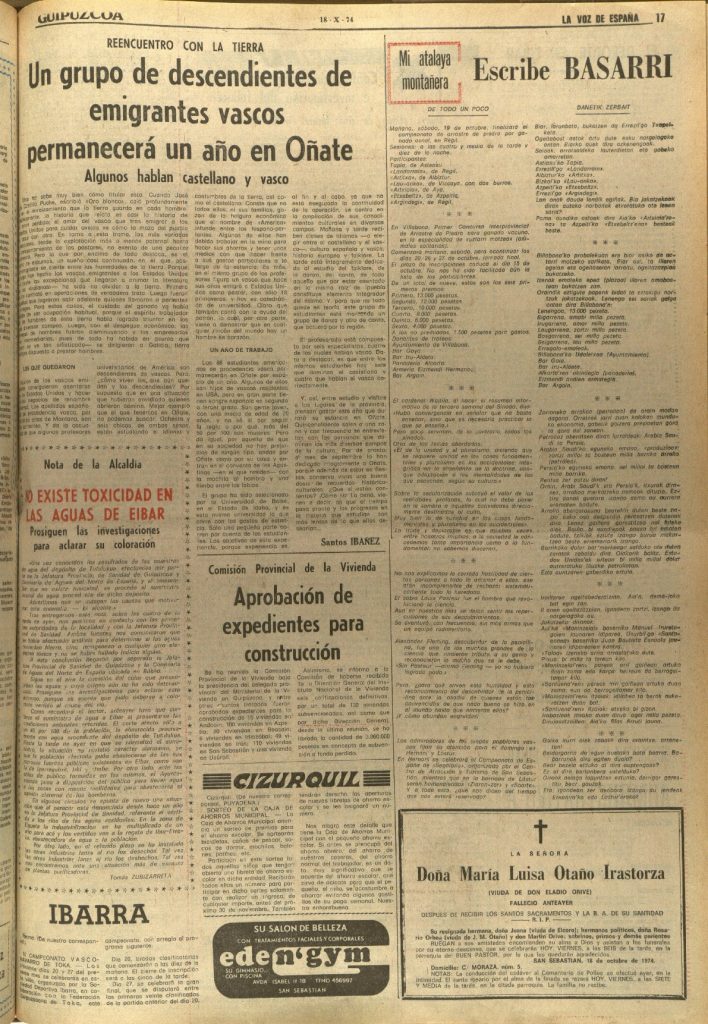
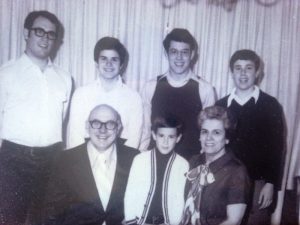
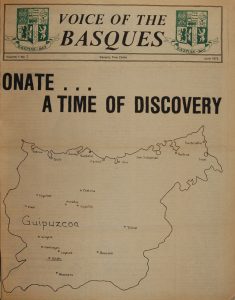
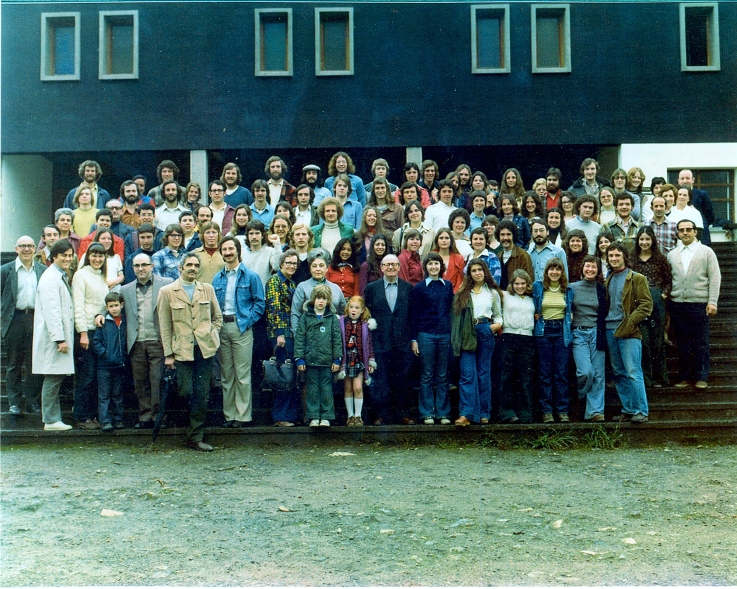
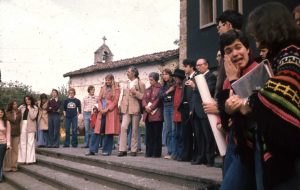

Hi Mark ,
Jason sent me your beautiful article and I really understand your experiences in your first visit to Spain. Although at that time I was playing Jai Alai in Tampa, I grew up with most of your experiences. The only difference is, that to me that was the norm. I didn’t know anything different than the Franco and Guardia Civil influence that got stamped in your mind. That’s the way it was for us growing up.
Please include me in your blogs since appears to me that you like to write articles and clearly, you are good at it.
Regards,
José Goitia
I enjoyed reading your article. My parents started sending my sisters and me to Spain when I was 8 for the entire summer. I always remember hearing how dangerous it was because of ETA. I go every other year now as an adult and I love my time there in Navarra.
Dear Mark, I thoroughly enjoyed this article and love your writing style! I still see members of your family at Mass every weekend at St. John’s. All the best!
Lori Mallory
Truly fascinating!
I really enjoyed that glimpse into your past, as well as all the other wonderful sensory treats that made the story come alive.
I am half Basque. My mother is Jo (Murelaga) Dickinson from Boise.
I met one of your brothers when we both went to U of I, many years ago and always admired what great Basque dancers you all were!
Unlike my other cousins, Teri Arriola, the Murelaga girls, and the Guerricabeitias, I was raised in Spokane and had to try to maintain links to my heritage with yearly pilgrimages to Boise for the Basque picnics, and later, adding Jaialdi as often as it was manageable.
I don’t know if you’ve read the book, “Guernica” by Dave Boling, but we were married for 30 years and researched that book together, going back to my roots in Lekeitio.
I’m not sure why I felt compelled to write, let alone go on about my own Basque history? I mostly just wanted to thank you for the amazing peek into a dark period of time, in the not very distant past!
It was truly fascinating.
Thank you,
Kay Boling
Great article Mark. Thanks for sharing.
I just loved reading this, what a lucky boy you were. You stirred up some memories and visuals too. I think it was Dave McCoy who took the photo. Euzkadi has come a long way since that year and is more beautiful and fun than ever. Hope to see you at Jaialdi this summer.
Yes, you were a 7 year-old rock star that year, and you learned to speak Basque better than anyone on the study abroad program that year. I remember your brother Dave was high school but had to go into the 5th grade in Oñate. I ran into him one morning at the fronton in the plaza, he was sitting on the sidelines while his classmates were having recess. They would not let him play because he was too big. Your mom and dad were amazing, wonderful people, and our year with them was an important time for all of us, and life-changing for many of us.
Mike
p.s. – No, there was no peanut butter in Oñate … until I bought a coffee grinder and a can of peanuts.
Hello, Mark Bieter
Great article that takes me back in time to Oñate and the Augustinian priests where i went to school. Supposedly in order to eventually become a priest. That, did not work out well and eventually ended up in NYC as a worker and owner of a small construction company.Being a non speaking basque in Onati a few years before your stay was a defining moment for me. There i become aware of the fact that i was basque and only basque and not spanish or french and in my idealized mind i decided that i did not want to pledge alliance to a country that i did not consider my own, so i left Spain and ended up in Bayonne NJ and later NYC eventually becoming a citizen of a country that i FREELY chose and feel comfortable with.
Today i frequently travel between the States, Spain and other places and not being a kid anymore my view of the world has become more sanguine, but Onati thought me that i was a basque and appreciation for FREEDOM made me a naturalized american.
Salud,
Fernando Ainz
Enjoyed your story, and pictures. Was surprised to see the ‘Voice of the Basques’. I have that same copy!! Have had it forever, and no idea where I got it.
Eskerrik asko
Great article Mark!!So many good memories of the program. The best conclusión is thar after 40 years we are still close friends. Zorionak Mark!
I really enjoyed reading your article. I am Basque, born and raised in Mutriku. I lived those dark years during Franco’s power, always afraid of the “Guardia Civil” and afraid of speaking Basque at my school run by Spanish nuns.
I live near Philadelphia, PA and reading your article brought back many memories.
Eskerrikasko!!!!!!!
Jone
Kaixo Jone: acabo de leer lo que has escrito sobre ese tiempo de terror para muchos vascos! Necesito practicar un poco mi Euskera, pero no tengo con quien! Argentinan bizi naiz. Eskuminak. Agur eta ondo pasa. Mario Aranburu Ugalde. You can also write to me in English, if you want to.
I was in a college program in Madrid early 1982. Franco’s was still evident. Guardia Civil on every corner. ETA dropping bombs of propaganda in the streets. Girls not allowed to take boys up to their apartments. Old women in black everywhere. I’ve come back to live here now in Valencia.
Brings back memories of my first trip to Spain in 1949 with my family. We stayed 6 months mainly in the Basque region.
Wonderful article Mark!
Thank you!
Nicolas Ardanaz